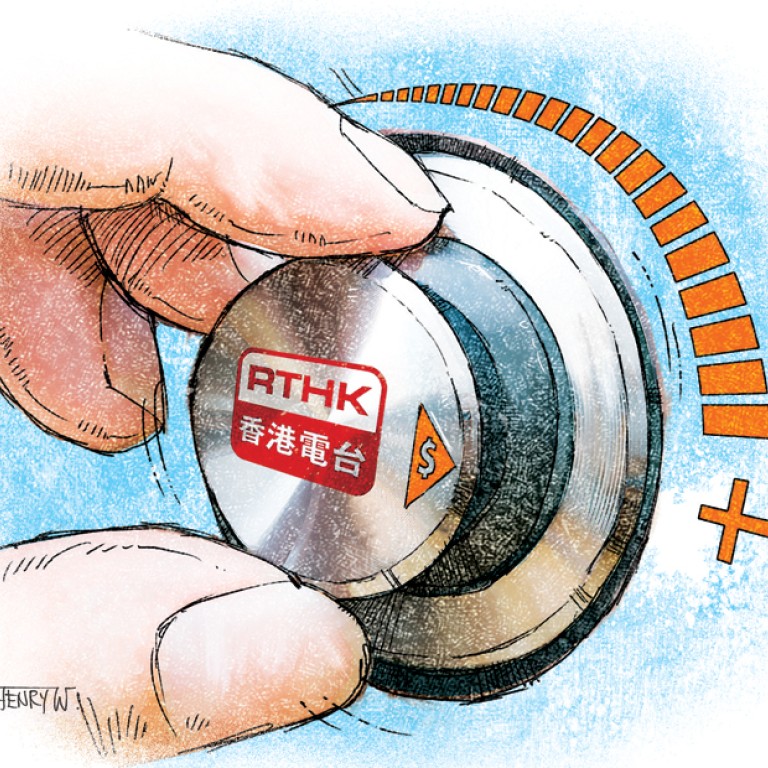
New | Why Legco should approve higher funding for RTHK headquarters
Robert Chua says inflation and RTHK's broader scope of operations have inevitably raised the budget for its new headquarters, but the spending for good-quality TV will be worth it
This Wednesday, the Legislative Council's public works subcommittee will consider RTHK's request for a substantial increase in public funding for its new headquarters, from HK$1.6 billion to HK$6.1 billion. Many people have objected to the higher budget without studying the facts and rationale behind it. I, for one, think the increase is reasonable.

I expect its new channels will be similar to the credible and popular Discovery channels. One is expected to produce and air programmes on topics usually shunned by commercial TV channels - for example, shows specifically for minorities and the elderly, on art and culture, and relays of the regular Legislative Council meetings. Some people may deem these boring, but they will cater to a more diverse audience.
RTHK, which started operating in 1928 as a radio broadcaster, has been housed at Broadcast Drive in Kowloon Tong since 1969, two years after TVB started there. Soon after that, it began working with the Education Bureau to produce ETV, a series of programmes aimed at students, working with one TV studio. In the mid-1980s, it acquired three studios previously used by Commercial Television and TVB.
It is unproductive to have RTHK operating from three locations. Besides, it is running out of space, and has resorted to using containers to operate a couple of radio channels. Any major TV station in mainland China is better equipped than RTHK; it is embarrassing if it has only a small broadcasting centre.
Further, it is misleading to claim, as some have, that the HK$1.6 billion estimate was made in 2009. It was in fact made in 2000, based on its then scope of operation - mainly a radio broadcaster and a TV "production studio" making limited programmes to be aired on TVB and ATV. Today, it is expected to also operate three TV channels.
Also, the estimate of HK$1.6 billion made in 2000 did not include a 20 per cent buffer for inflation. By contrast, its new estimate of HK$6.1 billion budgeted for this 20 per cent, and also HK$500 million for contingencies.
TVB City cost about HK$2 billion to build in 2003; it would cost a lot more if it were built today, a decade later. From press reports, I gather that Hong Kong Television, in its proposal for a free-to-air TV licence, estimated in 2011 that it would cost HK$600 million to build its headquarters but revised it to HK$800 million only a year later - a 33 per cent increase over just 12 months. And these two TV stations' services do not include 12 radio channels, extensive new-media productions, and archiving operations which RTHK needs to include in its new Broadcasting House.
RTHK will be built on a much larger plot of land than was originally planned in 2000. As we go digital, all RTHK productions will need to be shot digitally for its TV channels, and five new digital radio channels have been added to its current seven radio channels. These extra services require IT server rooms, archiving decades of TV and radio programmes and storage for hundreds of thousands of songs on vinyl and tape.
RTHK won't have a "Rolls-Royce" set-up as some people claim. That's because the public broadcaster is obliged to go through a tender process and accept only the lowest bid from any supplier that meets its requirements. RTHK cannot just choose any branded equipment.
For all these reasons, the increased budget for RTHK's new headquarters is justifiable. As a TV broadcaster, it needs to build a TV station, not just TV production facilities. I am confident RTHK will deliver good-quality programmes, both local productions and overseas acquisitions, within its initial operation of two-and-a-half hours of programmes during weekdays and four to five hours at weekends. I hope they will air 24 hours a day, with repeat programmes to fill the slots for now.
It is important that Hong Kong has a government-funded TV station alongside its commercial ones, as in Britain, Australia, Japan, Malaysia and Indonesia. At least we will be guaranteed some high-quality programmes to counter the many tasteless ones that are eroding our values.
When the public works subcommittee meets, I hope those legislators who do not watch much television will nevertheless consider people's need to have a choice between good and poor programmes. Some programmes that RTHK will broadcast "live", such as the Legco hearings, may be boring, but at least they are informative.
Legco should approve the funding and not force RTHK to delay construction of its new broadcasting house. Another tender exercise will mean yet another price adjustment because of inflation and will further delay the broadcasting of better programmes for Hong Kong people.
